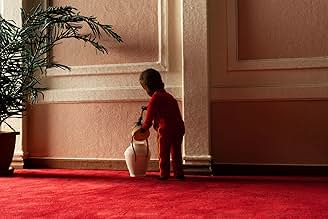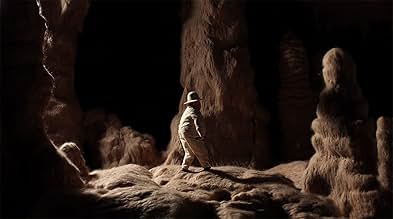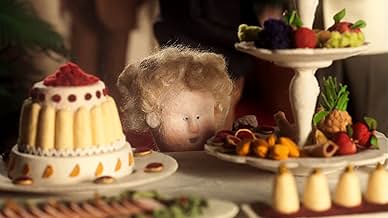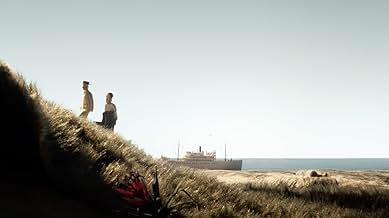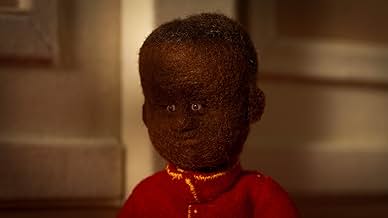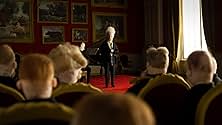Ce magnifique gâteau!
- 2018
- 44min
CALIFICACIÓN DE IMDb
7.1/10
1.4 k
TU CALIFICACIÓN
Agrega una trama en tu idiomaAn anthology film set in colonial Africa in the late 19th century telling the stories of 5 different characters: a troubled king, a middle-aged Pygmy working in a luxury hotel, a failed busi... Leer todoAn anthology film set in colonial Africa in the late 19th century telling the stories of 5 different characters: a troubled king, a middle-aged Pygmy working in a luxury hotel, a failed businessman on an expedition, a lost porter and a young army deserter.An anthology film set in colonial Africa in the late 19th century telling the stories of 5 different characters: a troubled king, a middle-aged Pygmy working in a luxury hotel, a failed businessman on an expedition, a lost porter and a young army deserter.
- Dirección
- Guionistas
- Elenco
- Premios
- 4 premios ganados y 10 nominaciones en total
Jan Decleir
- The King
- (voz)
Bruno Levie
- Georges
- (voz)
Paul Huvenne
- Narrator
- (voz)
Gaston Motambo
- Ota
- (voz)
Goua Robert Grovogui
- The Lost Porter
- (voz)
- (as Goua Grovogui)
Angelo Tijssens
- Louis
- (voz)
Aziz Azam
- Extra voice
- (voz)
- Dirección
- Guionistas
- Todo el elenco y el equipo
- Producción, taquilla y más en IMDbPro
Opiniones destacadas
Five stories about Belgian Congo. The king Leopold II, a poor Pygmy , working in a hotel, dead after an absurd accident, a failed businessman and his strange friend, bottles of beer and stupid death, a porter and a young deserter , his African experienge and the return to home.
To define it as a critic against colonialism is exagerated. Only five sketches of stories about vulnerable people and their sad lives , dreams and events who are only a sort of stains lost in the way of world.
A generous short film because the sense of scenes is offered by viewer. In some measure, only by viewer because the director seems seduced by characters design, animation, colors, textures than the story itself.
To define it as a critic against colonialism is exagerated. Only five sketches of stories about vulnerable people and their sad lives , dreams and events who are only a sort of stains lost in the way of world.
A generous short film because the sense of scenes is offered by viewer. In some measure, only by viewer because the director seems seduced by characters design, animation, colors, textures than the story itself.
It is extremely different movie, I never have seen something similar. It is a powerful movie, but not extremely interesting. I also feel that the premise is not always clear. Yet, my friends loved this movie.
Positives: The French & adjoining northern regions produce great animations especially stop-motion. Sweden even got into the game with a bonus short. The craftsman(woman)ship for the characters, props, settings were, as far as I could tell, all magnificently crafted from wool (or it's compressed analogue - felt). So kudos for all that.
Negative: For the casual viewer the stories (supposedly satirical, metaphorical, symbolic) seemed too obscure with a fragmented flow.
Conclusion: Entertaining, but not something I'm going to remember.
"This Magnificent Cake" - the title remains as much of an enigma now as it did when I first sat down to watch this Belgian stop-motion animation.
Not only the puppets, but the props and almost the entire set, are constructed using wool or other knitted and woven fabrics, a remarkable achievement in itself. This unorthodox method is surprisingly effective at creating realistic outdoor scenes, even for things that one would not intuitively expect to work, such as a waterfall. The human puppets have very supple and naturalistic movements and I found them quite believable.
The interlinked stories begin in 1885, and are apparently set in the Congo Free State, although the territory is not referred to by name. The Congo Free State was ruled personally by King Leopold II, independently of the Belgian Government, and became notorious for the use of forced labour in rubber harvesting. According to some estimates, millions of Africans were killed by disease, reprisal killings or other atrocities in those years.
The film is not however an explicit critique of the Congo Free State in particular (the facts of which are presumably well-known to Belgians already) but more of African colonialism generally. The stories contain three familiar themes - the cruelty of European colonial rule; royal folly and vanity; and the way that colonial enterprises have always attracted rogues, chancers and misfits who travel to faraway lands both in order to find themselves, and to lose themselves. In one scene, an explorer is crossing a rope-suspended timber bridge with a train of enslaved African porters in tow; he eats a banana and casually tosses the skin behind him, causing the lead porter to slip and drag all his shackled comrades into the river gorge. In another episode, the King is at a recital of Saint-Saëns' "The Cuckoo in the Depths of the Woods" in the hotel. He furiously demands that the clarinettist stop playing, apparently because he can't abide the sound of wind instruments (which defeats the object, because the clarinet is supposed to recreate the cuckoo's call). The despondent musician wanders off into the forest. It is not always clear whether what we are witnessing is "real", a dream, or some kind of allegory. Two of the episodes take place in a big deserted house in the middle of the jungle - I assume this is the hotel but it is not clear why has it been abandoned.
The film prioritises quirky, sardonic humour over plot development, an approach that may seem out of keeping with the dark subject matter, but to give it credit, it tries to give the African characters some individuality and does not treat them merely as passive victims. One of the inherent problems in using knitted puppets is that it is difficult to feel much emotional involvement in a story in which the characters have no facial expressions. However, the craftsmanship and attention to detail is remarkable and it is never dull.
Not only the puppets, but the props and almost the entire set, are constructed using wool or other knitted and woven fabrics, a remarkable achievement in itself. This unorthodox method is surprisingly effective at creating realistic outdoor scenes, even for things that one would not intuitively expect to work, such as a waterfall. The human puppets have very supple and naturalistic movements and I found them quite believable.
The interlinked stories begin in 1885, and are apparently set in the Congo Free State, although the territory is not referred to by name. The Congo Free State was ruled personally by King Leopold II, independently of the Belgian Government, and became notorious for the use of forced labour in rubber harvesting. According to some estimates, millions of Africans were killed by disease, reprisal killings or other atrocities in those years.
The film is not however an explicit critique of the Congo Free State in particular (the facts of which are presumably well-known to Belgians already) but more of African colonialism generally. The stories contain three familiar themes - the cruelty of European colonial rule; royal folly and vanity; and the way that colonial enterprises have always attracted rogues, chancers and misfits who travel to faraway lands both in order to find themselves, and to lose themselves. In one scene, an explorer is crossing a rope-suspended timber bridge with a train of enslaved African porters in tow; he eats a banana and casually tosses the skin behind him, causing the lead porter to slip and drag all his shackled comrades into the river gorge. In another episode, the King is at a recital of Saint-Saëns' "The Cuckoo in the Depths of the Woods" in the hotel. He furiously demands that the clarinettist stop playing, apparently because he can't abide the sound of wind instruments (which defeats the object, because the clarinet is supposed to recreate the cuckoo's call). The despondent musician wanders off into the forest. It is not always clear whether what we are witnessing is "real", a dream, or some kind of allegory. Two of the episodes take place in a big deserted house in the middle of the jungle - I assume this is the hotel but it is not clear why has it been abandoned.
The film prioritises quirky, sardonic humour over plot development, an approach that may seem out of keeping with the dark subject matter, but to give it credit, it tries to give the African characters some individuality and does not treat them merely as passive victims. One of the inherent problems in using knitted puppets is that it is difficult to feel much emotional involvement in a story in which the characters have no facial expressions. However, the craftsmanship and attention to detail is remarkable and it is never dull.
I really wanted to love this short. When I satrted watching it, I was mesmerized by the animation, the character design, the colour palette, the textures, the voice acting and sound design...
Unfortunately, all these positive aspects were ruined by an extremely vague narrative posing as "dreamlike".
The "biting" humor doesn't work. The non-commentary on the horrors of racism and what Belgium's done in Congo is stumpy, to say the least. Are we meant to empathize with the racist, horrid characters because of their awkward, if a bit funnily gross representation?
The film, ultimately, doesn't say anything. That would be OK if it wasn't saying that it was saying something.
I'm extremely disappointed, hence the extremely low amount of stars.
¿Sabías que…?
- ConexionesReferenced in AniMat's Crazy Cartoon Cast: And The Nominees Are... (2018)
Selecciones populares
Inicia sesión para calificar y agrega a la lista de videos para obtener recomendaciones personalizadas
Detalles
- Fecha de lanzamiento
- Países de origen
- Sitio oficial
- Idiomas
- También se conoce como
- This Magnificent Cake!
- Productoras
- Ver más créditos de la compañía en IMDbPro
Taquilla
- Total en EE. UU. y Canadá
- USD 7,888
- Fin de semana de estreno en EE. UU. y Canadá
- USD 991
- 3 mar 2019
- Total a nivel mundial
- USD 7,888
- Tiempo de ejecución44 minutos
- Color
- Mezcla de sonido
- Relación de aspecto
- 1.66 : 1
Contribuir a esta página
Sugiere una edición o agrega el contenido que falta

Principales brechas de datos
By what name was Ce magnifique gâteau! (2018) officially released in Canada in English?
Responda

